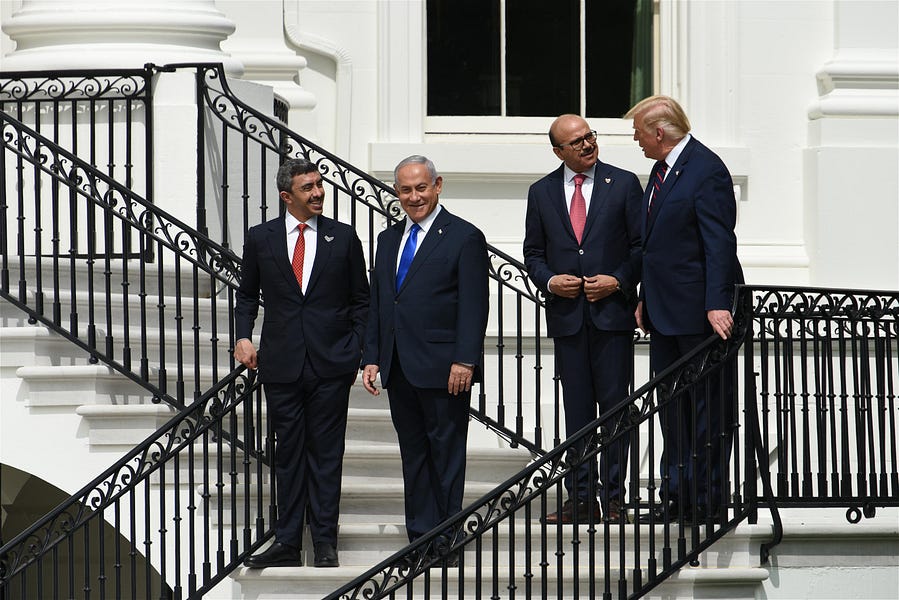Israel made peace last week with the United Arab Emirates and Bahrain, the most dramatic development in the Arab-Israeli conflict since Jordan and Israel ended their war in 1988. Remarkable in and of itself, the agreement was perhaps even more notable for what it omitted. Nowhere in the short text of the so-called Abraham Accords declaration was the word “Palestine,” a sad but in some ways fitting coda to the era of Palestinian primacy in the Middle East.
The shifts that ultimately led both the Emirates and Bahrain toward Israel have been long in coming, and the gallons of ink spilled on the occasion of the rapprochement credited the realignment to Iran. To be sure, the Islamic Republic has loomed large in the region for some time, and Tehran’s escalating aggression against its neighbors and domination of powerful proxy armies in both the Gulf and the Levant has only pushed Iran’s common enemies in the Sunni and Jewish worlds together. But Iran alone did not force this radical rethink of nearly a century of Arab policy. The Palestinians themselves bear much of the responsibility.
It has become cliché to echo the late Israeli Foreign Minister Abba Eban (though he was referring to the Arabs in general) on the Palestinians’ solid track record of “never missing an opportunity to miss an opportunity.” The misquote well conveys the gist of the problem: In 1947, the Palestinians turned their back on the historic United Nations partition that might have created two states side by side, distinct Jewish and Palestinian homelands (as indeed, the Arabs had rejected previous such recommendations made to the government of the United Kingdom, the mandatory power in what was then Palestine).
In the period between the Arab League’s failed war to prevent the creation of Israel and Israel’s conquest of East Jerusalem and the West Bank in 1967, Palestinian refugees outside “Palestine” proper and those living on the West Bank and in the Gaza Strip under Jordanian and Egyptian sovereignty, respectively, never reconsidered their opposition to a two-state solution. Neither the Hashemite Kingdom nor Egypt’s Gamal Abdel Nasser considered offering the Palestinian territories they nominally “occupied” to create a Palestinian homeland. The whole loaf was always the focus, and for too many years, terrorism was the preferred tool to achieve it.
Lost to all but the victims are the Palestinian terrorist organizations that mushroomed over the years; not simply the Palestine Liberation Organization (PLO), but the Popular Front for the Liberation of Palestine (PFLP), the PFLP-General Command, the Democratic Front for the Liberation of Palestine, Palestinian Islamic Jihad, Hamas and other more fleeting flirtations with politically motivated murder. Much as the combatants in Libya and Syria are now backed by competing Arab powers and Iran, these groups too were typically more focused on being sustained by their patrons than on making any actual progress towards a state, unitary or otherwise. Together, however, they made the Palestinian cause synonymous with terror.
Meanwhile, actual Palestinian refugees living by diktat in squalid refugee camps—to resettle would have scattered them to the diaspora, and the PLO in particular preferred for its subjects to live in misery, for maximum political effect. But life in refugee camps in Lebanon and Jordan held no promise for the Palestinian people—particularly after the events of Black September in which the PLO tried (twice) to assassinate the king of Jordan in 1970. In Lebanon, Palestinians were denied equal rights in the national constitution, and over the years, the most capable or able to move made their way to more welcoming nations, where they were able to prosper and support what family they were forced to leave behind.
In the territories newly occupied by Israel after 1967, the fortunes of Palestinians began to change for the better, ironically. The West Bank and Gaza economies skyrocketed—becoming the fourth-fastest growing economy in the world according to the World Bank—improving even as Israel’s economy stagnated in the 1970s. Life expectancy increased by a full decade. Children began to go to school in unprecedented numbers. Between 1980 and 1987, real per capita GNP increased by 12 percent. This improvement was driven by Palestinian work in Israel and rapid integration with the Jewish state, growing remittances from the Gulf and—it must be said—an improvement of Palestinian lives under Israeli occupation. But that was all to end in 1987 with the first intifada, the Palestinian revolt against Israel.
Was the intifada a poor choice? Certainly, in terms of economic progress and prosperity. But money and education and longer life is not everything; freedom matters. And then in 1990, another poor choice: The Palestinians en masse, along with their “leaders” in the PLO, supported the Iraqi invasion of Kuwait; Palestinian workers in the small Gulf nation were unceremoniously tossed out, another loss of income, remittances, and most of all, the beginning of the end of the Arab romance with Palestine.
Even after the Oslo Accords in 1993, there were more poor choices: The importation of the bankrupt exile Tunis leadership of the PLO to run “Palestine,” replete with all the corruption that is the hallmark of too much Arab governance. The inability to come to peaceful terms with Israel, certainly not the fault of Palestinians alone. The rising kleptocracy of the Ramallah government that ushered in a brief romance with Iranian-financed Hamas, which, though no longer loved, still governs Gaza. The celebration of the 9/11 attacks. The decision to side with Saddam Hussein in the Iraq War. The subcontracting to Iran of Palestinian “resistance.” The continued monopoly on rule by the aged and venal Mahmoud Abbas, now in the 15th year of his four-year “democratic” term as Palestinian president.
At the end of the day, the problem is that the Palestinians appear resolutely mired in the 20th century, and those parts of the Arab world that aren’t torn by conflict or ruled by Iran have decided that the “Palestine first” credo no longer serves their own interests or the Palestinians’. Perhaps, as some observers suggest, the new Sunni-Jewish axis in the Middle East will serve as a much-needed wake up call to the Palestinian people and their bankrupt leadership, and give Arab states new leverage over Israel to finally solidify a two-state solution. Certainly, they were able to point to a delayed decision by Israel to annex parts of the West Bank as a small victory. But there is little evidence that the fate of Palestine is high on the priority list for any of Israel’s new friends, pious protestations to the contrary notwithstanding. Nor is it clear that even were the Palestinians to gain something that looked like a state that their fortunes would be any better than they are under partial Israeli occupation.
What will it take to finally see a two-state solution? The answer lies partly with Iran, but mostly with the Palestinians themselves. For as long as the Islamic Republic continues to exploit the Palestinian cause in order to perpetuate its own effective occupation of Lebanon and Syria, there will be outside and Palestinian groups that will perpetuate the fight that underscores the problem of a peaceless “peace process.” The Palestinian people and their leaders must repudiate Iran’s utterly fruitless support. More importantly, they must revisit their path forward. Rejectionism has failed. Terrorism has failed. Extortion has failed. Perhaps the time has come to try good governance, in order to build a Palestine capable of being a partner for peace with Israel.
Photograph by Chen Mengtong/China News Service/Getty Images.






Please note that we at The Dispatch hold ourselves, our work, and our commenters to a higher standard than other places on the internet. We welcome comments that foster genuine debate or discussion—including comments critical of us or our work—but responses that include ad hominem attacks on fellow Dispatch members or are intended to stoke fear and anger may be moderated.
You are currently using a limited time guest pass and do not have access to commenting. Consider subscribing to join the conversation.
With your membership, you only have the ability to comment on The Morning Dispatch articles. Consider upgrading to join the conversation everywhere.